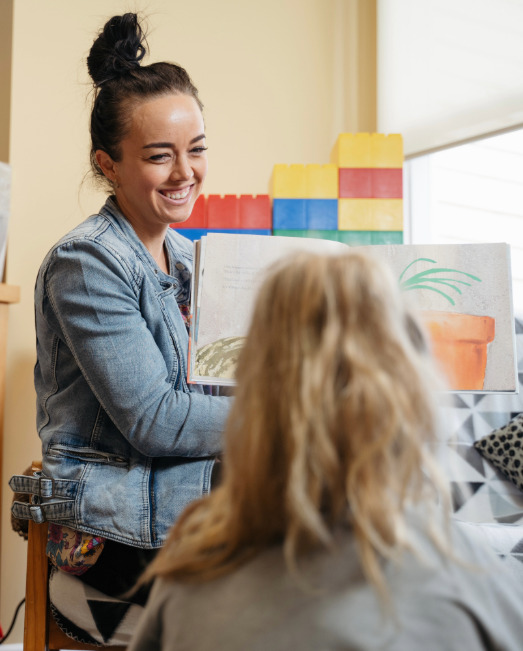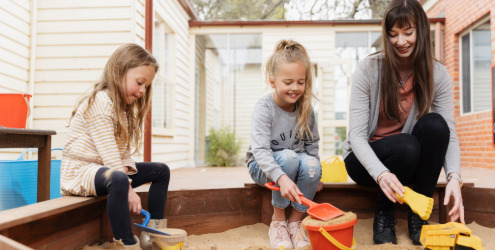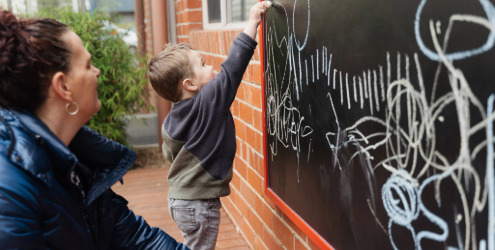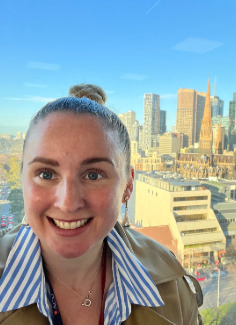Career
Copyright@ Australian Catholic University 1998-2026 | ABN 15 050 192 660 CRICOS registered provider: 00004G | PRV12008
Copyright@ Australian Catholic University 1998-2026 | ABN 15 050 192 660 CRICOS registered provider: 00004G | PRV12008

At an early childhood learning centre somewhere in Australia, two children race their way around the playground, side-stepping through their self-styled obstacle course to see who can get through it fastest.
A girl enters the fray, younger than the other two children, but instead of racing, this child picks up the obstacles. She plays with a wooden block as if it’s an aeroplane, holding it out in front of her and making whirring noises as she moves along.
“One of the things you’ll start to see little children do as they play is that they’ll transform an object into something else,” says ACU’s Dr Victoria Minson, a researcher whose work has focused on early childhood education assessment practices.
“So, a block might become a phone, and they’ll hold it up to their ear and say ‘hello’, but what’s significant is that they’re using their imagination and changing the meaning of an object.”
This developmental milestone means the child is starting to think symbolically, building the foundations for abstract thought.
“This can really help with things later in childhood – say, when they’re learning algebra and they have to use X in an equation. Playing and experimenting helps them to think beyond an object’s appearance and lean into some of those more abstract concepts.”
In decades past, those working in a preschool or daycare setting would typically leave the child in this scenario to explore on their own. More recently, however, advances in early childhood theory and brain development science have found that while child-led play is important, often adults can introduce concepts that extend and expand a child’s learning.
A skilled teacher or educator might therefore encourage the child to continue their symbolic play, sharing their ideas with others and creating new concepts and narratives to explore.

“A really intentional educator will know when and how to respond to such situations, taking the child’s learning in other directions and helping them to understand whatever the concept is,” Dr Minson says. “They can use their knowledge and skills to create interactions that are meaningful and attuned to a child’s specific interests.”
“The childcare debate is over. It’s not babysitting. It’s early education and it’s critical to preparing children for school.”
It was a watershed moment for many in the early childhood education sector. In announcing a long-awaited wage increase, the federal education minister echoed the sentiments of early childhood educators and teachers all over Australia in saying the words: “It’s not babysitting.”
Described variously as “historic”, “significant” and “a game changer”, the announcement followed years of advocacy, with early education professionals pushing not only to be paid enough, but also to be valued for the important work they do.
“These big groundbreaking moments don’t just come out of thin air – there’s a lot of lobbying and advocacy that happens prior to it,” says Dr Minson, who has extensive experience working in the sector.
“We need early childhood educators to be paid in a way that is commensurate to the work they do, but that’s just one element of a series of changes aimed at positioning educators in a way that shows how significant their role in society is.”
But here’s the rub: Much of the media reporting that followed the wage announcement referred to early educators as “childcare workers”, a label that some in the industry would prefer to see phased out.
Months earlier, Dr Minson published a piece in The Conversation titled, “Early childhood educators are not ‘babysitters’. What do their jobs really involve?”
In the article, she argued that early education is “not just care”.
“We’re talking about professionals who have undertaken specific training that enables them to work with children as educators and teachers,” says Dr Minson, a lecturer and course coordinator of ACU’s Bachelor of Early Childhood Education (Birth to Five Years) (Accelerated).
“That makes the language we use around early childhood educators really important. When we emphasise the ‘care’ label more than the ‘education’ label, we’re not recognising the training and skills required to create the educational environments that early childhood educators create every day.”
These professionals do more than wipe noses, they also use the principles of play-based learning to teach social skills, expand vocabularies, and introduce children to concepts that stretch their thinking to higher levels.
“Our brains develop faster in our early years than any other time in our lives,” says Dr Minson, pointing to neuroscience and behavioural research showing that 90 per cent of brain development happens in the first five years.
“The science shows that we lay the blueprints early on that help a child to develop and reach their full learning potential. Children having access to high-quality education therefore enables a positive trajectory, and educators and teachers play a crucial role in that process.
“There is still a care element to the profession, and it’s a very important element, but we must also recognise the role they play in providing the building blocks that prepare children for school and later life.”
For many parents arriving for the morning drop off, it might not be clear exactly who is who at their child’s kinder or preschool.
At last count, the early childhood education and care sector numbered some 216,000 employees, mostly women. Around 85 per cent of these workers have undertaken training, with a diploma or certificate III qualification to be an early childhood educator.

Working alongside educators are early childhood teachers. These staff members have a bachelor’s degree in teaching, giving them specialist knowledge to act as leaders in early childhood education.
While they do have a higher qualification than educators, in many cases their tasks overlap.
“In terms of what a parent might typically see, there’s not a lot of difference between what educators and teachers do,” says Dr Minson, who began her career as a diploma-trained early childhood educator before pursuing undergraduate and postgraduate study.
“The teacher might do more mentoring and supervision of staff, and they might have more oversight of the planning of education programs, but typically they’ll still work together with educators to design the program and play a role in its implementation.”
In early 2024, the first graduates of ACU’s accelerated early childhood teaching degree gained their qualifications, completing the four-year equivalent course in just 18 months. Many of these students are upskilling from diplomas in early childhood education and care, helping to meet the industry-wide shortage of both teachers and educators.
“It’s an exciting time,” says Dr Minson, “just seeing these students keep up with their studies while continuing to work in the profession. It’s great to be part of such an innovative program.”
Meanwhile, along with many others in the sector, she hopes the growing awareness of what these professionals do will herald a new era in early childcare education – one where their role in society is more widely recognised.
“There’s long been this idea that it takes a village to raise a child, but in modern Australia, not many families live in that traditional village set-up,” Dr Minson says. “Early childhood educators and teachers help to fill that gap, providing connection, community and support, so parents know their children are thriving while they’re at work.”
Dr Victoria Minson has developed an integrated approach to research and teaching scholarship, with a focus on children’s play, learning, assessment, and digital technologies. Drawing on her extensive experience, she applies theory and research to practice-based problems to create new possibilities for early childhood education.

Dr Minson is the course coordinator for the Bachelor of Early Childhood Education (Birth to Five Years) (Accelerated) at ACU. The Victorian version of the course has received funding from the Victorian Government and the Victorian Department of Education.
Copyright@ Australian Catholic University 1998-2026 | ABN 15 050 192 660 CRICOS registered provider: 00004G | PRV12008